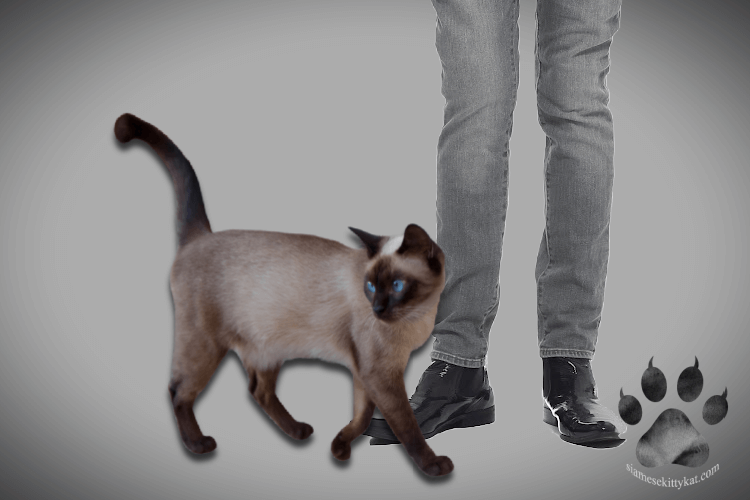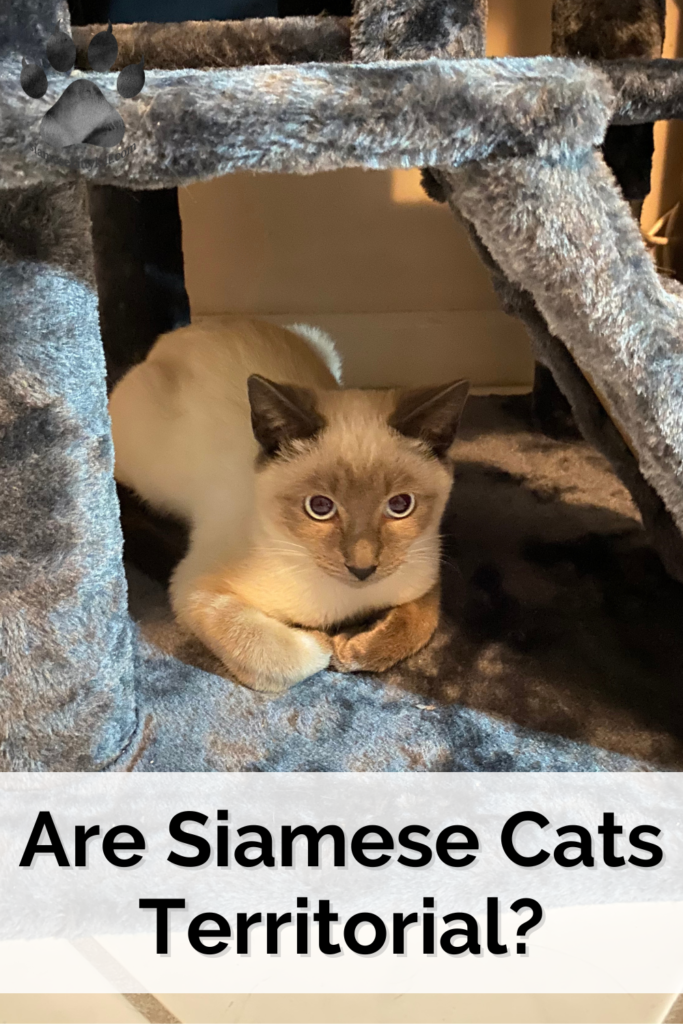It’s no secret that cats can be very territorial creatures. But what about Siamese cats? Are they any different when it comes to claiming their territory?
As it turns out, Siamese cats are just as territorial as any other cat. They may not show it the same way as other cats, but they definitely have their own areas that they consider to be their personal space.
This article will look at where this territorial instinct comes from and how to help your Siamese cat deal with it.
Do Siamese cats do well with other cats?
Siamese cats typically do well with other cats, as they are very social. They are also typically very playful and curious, which can help them get along with other cats.
However, there can be exceptions to this rule, and some Siamese cats may fight with other cats if they feel threatened or territorial. If you have multiple cats in your home, it’s always a good idea to keep an eye on them to ensure they’re getting along okay.
When you live in a multi-cat household, and if the neighbors are letting their cats roam the neighborhood, it’s not uncommon for your Siamese cat to feel threatened. This can make her particularly motivated to mark. She will find the best places to do this to let other animals know she means business.
Also, when you get a new cat, it’s best to slowly introduce it to your Siamese cats. They can get stressed if you throw a new cat into their territory. It’s best to introduce them slowly and do it so everyone can be calm and relaxed. It’s best to do it in a way that you can supervise the cats so they don’t fight.
What does territory mean for a Siamese cat?
Siamese cats are highly territorial animals. Their territory is their home, and they will do whatever it takes to protect it. This includes marking their territory with urine, fighting off intruders, and even attacking other animals. Siamese cats see their territory as their own personal space and will not hesitate to defend it.
What are signs of a territorial Siamese cat?

There are several signs that a Siamese cat is feeling territorial.
- Scent marking. Siamese cats mark their territories and other objects with a pheromone produced near the anus and on the cat’s paws. When another cat smells this pheromone, he knows that the area is already claimed and that he should keep away. When Siamese cats rub their chins on things, it means that the object belongs to them.
- Urine spraying. Siamese cats may spray urine inside the house to mark their territory and ensure that other animals know this is their space. This is when a cat will urinate in small amounts on vertical surfaces, like walls and furniture.
Siamese cats may also spray urine when they feel threatened or anxious, so it’s essential to keep them calm and relaxed if you see this behavior.
Neutered cats are less prone to spraying or marking unpleasant odors in an effort to mark their territory in your house. It is important that when you adopt a cat, he should be neutered – unless, of course, you want a lot of hissing, scratching up furniture and overall bad behavior.
It’s also important to have a vet neuter your cat so that it avoids constant pregnancies among female cats and becomes less aggressive.
- Scratching. Scratching is when a cat uses its claws to leave a mark on something. It is a way for the cat to mark its territory. If your cat scratches your furniture, you should buy a scratching post so the cat can leave a mark on the post instead of on your furniture.
- Aggression. Siamese cats may become more aggressive towards other animals and people who enter their territory. They may start hissing or growling at people or other animals. This is how they try to scare off anything they perceive as a threat.
When it comes to food, Siamese cats may guard their food bowls and not allow other animals to eat from them. They may also hiss or growl at other animals when they’re eating, which clearly shows they’re feeling territorial.
My Siamese cat is very particular about marking his territory. He has a special spot in the house that he likes to pee in, and he makes sure to leave his mark there every day. He also likes to scratch things to leave his scent behind. I’ve noticed that he likes to rub his face on furniture and door frames.
When we first got him, we had tried to train him not to scratch the furniture. But that just seemed to make him more determined to do it! He also likes to mark his territory whenever he goes outside by peeing on everything. We’ve trained him not to do this, but it’s been a losing battle so far. I guess we just have to accept that he is a very territorial cat!
He is very territorial and doesn’t like other animals coming into his space. If a cat or dog comes into our house, he will hiss and growl at them. He had never harmed another animal, but he likes to let them know that this is his territory and they are not welcome.
If you notice your Siamese cat exhibiting any of these behaviors, it’s important to figure out what is causing them and how you can help them feel more comfortable.
Are Siamese cats more territorial than other cats?
There are a few reasons why Siamese cats may be more territorial than other cats.
First, they are very bonded to their humans and want to be the center of attention. They are often very clingy and attached to their owners, making them seem more territorial.
Another reason may be that they are more vocal and assertive than other cats. They are more likely to let other cats know when they are not welcome in their territory.
Siamese cats are known for their loud meows, which some people interpret as a sign of aggression.
Batman and Robyn are very vocal, and they often use their voices to assert their dominance over their territory. They constantly meow or yowl to let me know that they consider me to be part of their territory. They may also be very possessive of me, and may become agitated or aggressive if they feel like I am being taken away from them by other pets.
Lastly, they are very intelligent and can quickly learn the layout of their home, which helps them know where their boundaries are.
Whatever the reason, we typically know Siamese cats for being very territorial, and they will usually do whatever it takes to keep other cats out of their space.
Are Siamese cats protective of their owners?

Siamese cats are often considered very protective of their owners and may even go so far as to defend them from perceived threats. This loyalty and protectiveness are likely due in part to the close bond that Siamese forms with their human companions.
Siamese are known for being very affectionate and attached to their owners, and this strong bond may lead them to view their owner as a member of their own family. As a result, they may feel a need to defend them from anything that they perceive as a threat.
In fact, your cat leaves behind a unique smell on you when he rubs against you. This smell is actually his oil glands. This smell means that you are his special property.
How do you stop your Siamese cat from being territorial?
If you have a territorial Siamese cat, there are a few things you can do to stop it.
- Spay or neuter your cat. This will help reduce the hormones that can contribute to aggression.
One of the most common reasons Siamese cats scratch and spray urine is to mark their territory. By getting your Siamese cat neutered, you can help to stop this behavior.
- You need to make sure that the cat has its own space that it can call its own. This means having a litter box just for them and a bed or perch that they can use to survey their territory.
- Provide your cat with plenty of toys and playtime. This will keep it occupied and distracted from its territorial impulses. It can also release its energy in a positive way.
- You can use spray or plug-in diffusers that have artificial pheromones in them. Artificial pheromones are chemicals made in a lab and are similar to natural pheromones that cats make. Cats will smell these artificial pheromones and will not scratch on furniture sprayed with these chemicals. The scent will make the cat think it is already marked, so he will not want to scratch or rub against it.
- You can try to keep your cat indoors as much as possible. This will limit its opportunities to act on its territorial instincts and hopefully reduce its territorial behavior over time.
- You can try to socialize the cat. This is done by slowly introducing them to other people and animals. This will help the cat to see that not everything is a threat and that there are other things in the world to explore.
- Make sure to give them plenty of love and attention. Siamese needs plenty of interaction with their humans to feel secure.
- Avoid punishment or scolding. This can only make the problem worse.
- You need to be consistent with your rules and boundaries for the cat so that it knows what is expected of it.
- You need patience and understanding when dealing with a Siamese cat’s territorial behavior. It can take some time, but eventually, you can break your territorial cat of its habits.
Conclusion
I hope you enjoyed reading about Siamese cats. These beautiful felines make excellent pets if you want to welcome a new member into your home. However, they are known to be territorial, so make sure you have the time and space to properly introduce them to your existing pets. I encourage you to continue reading about these beautiful cats and contact me if you have further questions. I am always excited to read your questions. Thank you for reading!
Want to learn more about your Siamese cat’s behavior? We have compiled every information you need to navigate through the fascinating world of Siamese cats: Everything About a Siamese Cat’s Behavior: A Comprehensive Guide
Get your FREE Siamese Cat 2024 Printable Calendar


